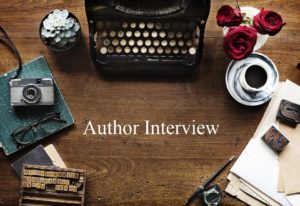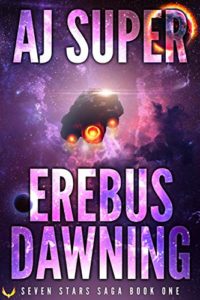An Interview with AJ Super
 When I read 2021 Debuts author AJ Super’s bio—the part where she mentions living with her “two fuzz-brained kittiots”—I knew we’d get along just fine. And while I haven’t met her in person and write a genre very different from that which she is drawn to, I’m now convinced we’d be fast friends. Anyone who describes herself as “chaos incarnate” can slide easily into my life. All joking aside, AJ is a dedicated writer hard at work on the Seven Stars Saga, the first of which, Erebus Dawning, launched on Tuesday. She has a routine down pat and that includes time for social media, writing, and of course dealing with the kittiots. AJ is also very involved in critiquing other writers’ work, and the latter half of her day can be spent in that way. Like with every single author I interview, AJ is super (ha!) busy, so I’m extremely grateful she took some time to answer these questions.
When I read 2021 Debuts author AJ Super’s bio—the part where she mentions living with her “two fuzz-brained kittiots”—I knew we’d get along just fine. And while I haven’t met her in person and write a genre very different from that which she is drawn to, I’m now convinced we’d be fast friends. Anyone who describes herself as “chaos incarnate” can slide easily into my life. All joking aside, AJ is a dedicated writer hard at work on the Seven Stars Saga, the first of which, Erebus Dawning, launched on Tuesday. She has a routine down pat and that includes time for social media, writing, and of course dealing with the kittiots. AJ is also very involved in critiquing other writers’ work, and the latter half of her day can be spent in that way. Like with every single author I interview, AJ is super (ha!) busy, so I’m extremely grateful she took some time to answer these questions.
Christina: Erebus Dawning is the first in the Seven Stars Saga and has been called a “wondrous blend of science fiction and fantasy.” What about these genres call to you? Do you think they can provide something that other genres cannot?
AJ: I grew up reading science fiction and fantasy. They were my summer getaways, even when I was vacationing at my grandparents in Washington. My grandma had the best stash of female sci-fi and fantasy writers: Anne McCaffrey, Ursula K. Le Guin, Mercedes Lackey, just to name a few. I would spend hours on the floor of their game-room reading page-upon-page, much to my mother’s chagrin. They transported me. They provided not only entertainment but windows into the depths of humanity. Octavia E. Butler says it best: “I was attracted to science fiction because it was so wide open. I was able to do anything and there were no walls to hem you in and there was no human condition that you were stopped from examining.”
Christina: The book is also described as a space opera. Some readers might not be familiar with that term. How would you explain what a space opera entails? And do you agree with the term being applied to your work?
AJ: Space opera is such a broad term that applies to many types of science fiction novels. However, I’ve heard it applied to stories that I would rightly consider military sci-fi as well as harder sci-fi than what mine qualifies as. That said, my personal definition of space opera is a story that includes a broad universe where the story, no matter how small, plays out. Space operas tend to have rich political backgrounds that drive the story in some way, whether it be overtly or not. Space operas also tend to be a bit softer on the science. But again, that’s just my opinion. Honestly, my book—my trilogy—it is a space opera. While Erebus Dawning itself is placed on a smaller stage of the universe’s politics, it is but a stepping stone into the grand stage itself. I won’t give away anything, but doesn’t Mademoiselle la reine just roll off the tongue?
Christina: A book series needs to be well-planned. Had you always wanted to write a series, or is that something that arose organically? Whether you planned it or not, how much work goes into the writing of a series?
AJ: Oh dear. This is where I raise my hands to the heavens as they grow black and stormy. A wind whips up. Lightning cracks. And I say: “I am chaos incarnate.” I will admit that while I wanted Erebus Dawning to be a longer series, I originally wrote it to be a stand alone with series potential. As such, I made no plans. Also, I am chaos incarnate. I’m a pantser, and I literally plan nothing. I write from a blank page. If I plan something, it completely ruins my creative process for some reason. Case-in-point: I just tried to plan Queen of the Black, Book 3 of the series, so that I could close the series, and it ruined my mojo. So, I’m starting over for the third time. (Third time’s the charm?) But that means I may have an open end. And I may be having a discussion shortly with my publisher about working on a fourth book. Time (and some serious writing) will tell.
Christina: Erebus Dawning features a strong female protagonist. Is she inspired by your “feisty grandmas”? What have these women taught you, and how have their lessons affected your writing?
AJ: Whenever I write strong female characters, I always think of the strong women in my life, from my mother and my mother-in-law to my grandmothers to my little sister. I actually dedicated Erebus Dawning to my grandmothers though. (And the hubster, but that’s a different story.) My grams Bobbi is the grandmother I mentioned before who had the wondrous collection of fantasy and science fiction and let me read in the summers rather than forcing me outside to play with the cousins. She definitely instilled a great sense of imagination and creativity, as well as a sense of being able to empathize with humanity by letting me read those books in peace. My grams Lillian is the woman who wanted to be a carpenter when women weren’t carpenters. Of course, there were family circumstances and her dream never came true, but because of that she always taught me to fight for what I wanted, to dream big, and strive for that dream. I honestly doubt either women would ever take credit for any of this. But honestly, between them, and the support of my husband, I would never have decided to write full time, or at all. And this dream that is the Seven Stars Saga would be a passing fantasy.
Christina: On your blog, you feature a short collection of poems you wrote years ago called “girl or just violence from here.” They are short, honest poems full of observations and color. What was your intention in writing these poems? Is color something you focus on in all of your writing?
AJ: Les Étoiles me préservent. I can’t believe you unearthed those. Originally, they were written for a poetry capstone class and made into the angstiest of angsty chap books for the culmination project. Eventually, I culled the not-so-great ones and ended up with these semi-decent-still-super-angsty poems from my twenty-somethings that had a theme in common . . . The everyday violence women have to endure, from fear of walking down the street at night, to being alone in a laundromat, to rules we create for ourselves to keep us safe, to outright fear of unwanted sexual advances and rape. The things that color our world as females. At the time I wrote them, I couldn’t have told you why I wrote them, but with age, I can see the lines of anger, fear, sadness, all dressed in the bright and colorful world of a twenty-something. Of course, it didn’t help that the people I hung out with were artists whose lives were color and form, so my writing took that shape. I still have a tendency to overwrite in color that my editors have both nailed me on and brought me back a bit. But one of the conceits I use in the series is color-oriented, and it plays strongly on the impression Nyx, the main character, has on certain characters.
Christina: What is the most difficult part of your artistic process?
AJ: Writing? No. I love telling myself a story. Editing? No. Polishing the story is like making a piece of tarnished silver shine. No, for me, the most difficult lies in the in-between. There is a balance most pantsers have to strike when writing, and then when editing. As someone whose creativity is completely obliterated with any semblance of a plan, this is a razor’s edge. I actually do plan, but it’s not how you would think. The night before I start a chapter, I’ll have a short conversation with my husband about where I am in the book, where it’s progressing, i.e., if there’s a plot point in my head I want to hit, and what that next chapter looks like to reach that point. Most of the time it’s just vagaries and what-ifs, but it draws me a small map for the next day. Finding that balance between a plan, expected plot points, and the blank page while drafting is definitely difficult. Then when editing, once the story is told, I still don’t plan. (Remember, I am chaos incarnate.) I go through everything line by line, and note by note, and if something changes drastically and I have to run back to the beginning, I just suck it up and run back to the beginning and make the changes so that the book is coherent. I know that there is likely an easier way . . . But . . . The only way to keep my creative gears turning is to move forward, step-by-step, not knowing what comes next. It sates the explorer in me and excites me for the journey that is writing.
AJ can be found in multiple places!
Website: https://www.ajsuperauthor.com/
Instagram: @angelajsuper
Twitter: @AllBrevityWit
Facebook: @angelajsuper
Thanks to AJ for agreeing to this interview! If you know of an author who’d like to be featured in an interview (or you are an author who would like to be featured), feel free to leave a comment or email me via my contact page.


Thank you for the wonderful interview! I hope one day to meet you in person because I do believe we would be fast friends. One thing I never got a chance to change on my bio is that I now have THREE fuzz-brained kittiots. The third is a kitten so he’s a bit of a handful and definitely more of a fuzz-bucket than the other two. I had a lot of fun with this interview and I’m very glad I did it! Thank you so much for your time. Be well. Be safe. Lots of love!
Thanks for participating, and clarifying! If I get a chance (I have to teach in a few), I’ll add that little tidbit. And we have three cats as well. Stay sane this week!